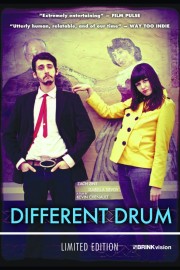Different Drum
As with his first film, “Young Islands,” co-writer/director Kevin Chenault doesn’t appear interested in telling a through-line narrative so much as just putting characters together, and seeing where things go. This isn’t a bad thing: sometimes, too much emphasis is put on needing to tell a story. The great thing about cinema is that the filmmaker has infinite possibilities, and no fixed amount of time, available to them when it comes to introducing us to their characters, and throwing us into their lives for however long they please. True, having some underlying structure is important, but that needs to be clear to the filmmaker only– it’s up to the audience to decide whether they want to go along for the ride or not.
“Different Drum” has more of a clear narrative than “Young Islands” did, but Chenault maintains the more evocative, image-based style of that film (which I likened to a tone poem) than a formulaic piece of storytelling. His main characters are Tod (Zach Zint) and Lydia (Isabella Devoy), a former couple who are sharing a car to go to Tod’s mother’s wedding. They’re still friends, but the relationship just didn’t work. Now, Lydia is pregnant, while Tod is just…aimless, I guess would be the best way to put it. He’s an out of work musician, and the first time we see him, he steals $5 worth of clothes from a thrift store after claiming he has to go out to his car while at the check out. He seems like kind of a dick, but that’s debatable, given some of the attitude we see people give him and Lydia while on their road trip. Did Tod’s mother, who asked Lydia to bring him for the wedding (we get the impression Tod is not close to his family), want them to travel together in hopes of them getting back together? I’m actually kind of glad Chenault seems less interested in that, and rather just allows these characters time together without really shoehorning in a romantic subplot.
Chenault has a keen eye for images, and how best to bring his films to life visually, and he and cinematographer Eddy Scully do a lovely, low-key job with that here. This is a simple film, uncluttered by unnecessary subplots, although filled with interesting situations, such as the different petty crimes that are committed (like when Tod and Lydia are held up, but don’t worry, they never feel like they’re in danger); the moments when Tod is going to the bathroom, which normally wouldn’t be worth mentioning, although he does get some big news during one of them; when Lydia gets smacked in the eye with a branch; and when Tod’s mother wants them to pick up his cousin, whom he hasn’t seen in years, leading to an interesting dilemma of how to break the ice, and some entertaining adventures along the way to finally meeting up with Tod’s mother at the end. I compared watching Chenault’s first film to watching a Terrence Malick film, and that still holds true for this one, as well: the important part of the experience isn’t whether we have a story to follow, but whether we follow the characters on whatever experiences they have. I certainly do, not necessarily out of any personal identification with the characters, but because it’s interesting to see how Chenault gives them room to make an impression on us rather than just insisting we accept them and follow them. There is a difference, and it’s proof that like his characters, Chenault marches to the beat of his own drum, and I can always get behind that.










